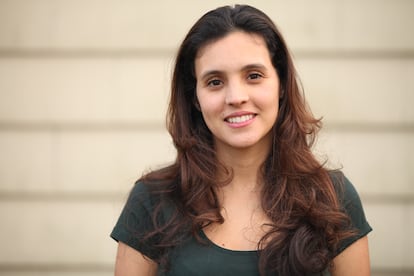Case of Bolivia teen raped by a relative reaches human rights court, two decades later
Brisa de Angulo Losada was abused at the age of 15 by her older cousin, but was ridiculed and shunned by family members, prosecutors and forensic examiners when she filed a complaint


At an unprecedented hearing, the Inter-American Court of Human Rights (IACHR) has heard testimony from a woman who was raped by a family member almost 20 years ago, when she was a teenager. The case has reached the supranational institution after meandering for years through the Bolivian justice system, which failed to provide justice.
Originally from Colombia, Brisa de Angulo Losada told the court on Tuesday that she was 15 the first time her cousin Eduardo, 27, sexually abused her at her home in the Bolivian city of Cochabamba. The following day she testified again in a case called Angulo Losada vs. Bolivia on events that occurred two decades ago and for which she has unsuccessfully sought redress all these years in the country where she grew up.
“He raped me every day for eight months and brainwashed me so I wouldn’t say anything to anyone,” she says, speaking to EL PAÍS a few hours after giving evidence at the first public hearing.
Angulo Losada says that after being coerced by her cousin to keep quiet, she developed bulimia and anorexia and attempted suicide twice. Alarmed but unaware of what their daughter had gone through, Angulo Losada’s parents took her to a psychologist where she spoke about the rape for the first time. “Like most incest victims, I didn’t know that what was happening to me was a crime. I hated it. I told him [my cousin] I didn’t want to, but I wasn’t aware it was a crime. When I thought of sexual violence, I thought of a dark alley, a stranger, not a family member who took care of me and was trusted,” she says, adding that more than 70% of sexual abuse in childhood occurs within the family environment.
When her parents discovered what had been going on, they did everything they could to help, but the rest of the family took a different view. “My uncles, grandparents and cousins turned their backs on me,” she says. “Even now, as I was testifying at the IACHR, an aunt and a cousin kept saying horrible things, that I am a liar.” According to Angulo Losada’s lawyer, Bárbara Jiménez of the non-profit Equality Now, it is common for family members to react with disbelief and to protect the attacker. “Often the victims are left alone,” she notes. The distrust makes it even more difficult for children and teenagers to speak out.
The courts in Bolivia did not believe her, either. According to Angulo Losada, the professionals who performed the forensic examination made fun of her, the prosecutor blamed her for the rape and the judge reduced the charge from rape to statutory rape, a crime that carries a lower penalty and is applied in 17 Latin American countries. “I was always treated as a liar, and they said I did my best to seduce him,” she says. “They blame the children and teenage girls for having done something to deserve such violence.” Twenty years later, Angulo Losada’s assailant is still at large.
As part of her bid for justice, Angulo Losada established the first shelter in Bolivia for child victims of abuse and she has become a lawyer to defend victims and work to prevent such crimes.
“I feel very emotional after so many years struggling to be heard,” she says about the hearing at the IACHR courtroom. In contrast to what she experienced in the Bolivian courts, she felt that the members of the IACHR treated her with dignity. “I am not asking for money or compensation, but for legal reforms so that other children do not have to go through what I went through,” she says. “My dream is for the IACHR to establish international legal standards so that Latin American countries can prevent situations like these from happening to other children and teens.”
Audiencia Pública del Caso Angulo Losada Vs. Bolivia https://t.co/sUWhk0yN9x
— Corte Interamericana de Derechos Humanos (@CorteIDH) March 29, 2022
Angulo Losada has also requested that the IACHR change the definition of rape. “We want it to be based on a lack of consent and not on the use of force because the latter fails to address coercive situations where the use of force is not present, such as in incestuous relationships, abuse of power or when the victim is under the influence of substances,” explains Jiménez. In Angulo Losada’s case, “there was intimidation. He told her that if she told her father, he would be upset and that he would do the same to her sisters.”
Another of Angulo Losada’s aims is to ensure that this type of crime is not subject to the statute of limitations and that there is mandatory education both in schools and in the different state institutions to raise awareness and help prevent it.
Angulo Losada believes that the rise of feminism in Latin America and of movements such as #MeToo and #YoTeCreo have helped to make cases of sexual violence against women and minors more visible and have contributed to a degree of social and judicial progress. But in her opinion, much remains to be done: “Personally, I think the changes are very slow. It’s frustrating.” But she hopes that her case will take the issue another step in the right direction.
Tu suscripción se está usando en otro dispositivo
¿Quieres añadir otro usuario a tu suscripción?
Si continúas leyendo en este dispositivo, no se podrá leer en el otro.
FlechaTu suscripción se está usando en otro dispositivo y solo puedes acceder a EL PAÍS desde un dispositivo a la vez.
Si quieres compartir tu cuenta, cambia tu suscripción a la modalidad Premium, así podrás añadir otro usuario. Cada uno accederá con su propia cuenta de email, lo que os permitirá personalizar vuestra experiencia en EL PAÍS.
¿Tienes una suscripción de empresa? Accede aquí para contratar más cuentas.
En el caso de no saber quién está usando tu cuenta, te recomendamos cambiar tu contraseña aquí.
Si decides continuar compartiendo tu cuenta, este mensaje se mostrará en tu dispositivo y en el de la otra persona que está usando tu cuenta de forma indefinida, afectando a tu experiencia de lectura. Puedes consultar aquí los términos y condiciones de la suscripción digital.








































